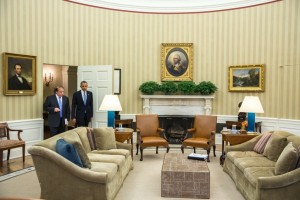The same day that the White House released 94 pages of Benghazi emails, which not only show that most at CIA supported the talking points used by the Administration but also include annotations of the CIA roles involved that reveal far more about CIA’s structure than any FOIA response I’ve ever seen, Tommy Vietor went on the record about UndieBomb 2.0 with both the WaPo and MSNBC. It appears he did so to reinforce the fear-mongering language Eric Holder used (though like Holder, Vietor doesn’t explain why John Brennan got a promotion after contributing to such a damaging leak). He said this to WaPo.
Vietor said that it would be a mistake to dismiss the unauthorized disclosure because al-Qaeda failed to carry out its plot.
“We shouldn’t pretend that this leak of an unbelievably sensitive dangerous piece of information is okay because nobody died,” he said.
But the WaPo account also seems to serve (like the Benghazi email dump does) to place blame on CIA.
It answers a question I hinted at yesterday: whether the CIA and White House were on different pages on what to do with the AP story. Reportedly, after AP had given the CIA time to kill Fahd al-Quso (the WaPo doesn’t mention that was the purpose of the delay), CIA’s Mike Morell told the AP the security issue had been addressed, but asked for one more day. As AP considered that request, the White House overrode that discussion.
Michael J. Morell, the CIA’s deputy director, gave AP reporters some additional background information to persuade them to hold off, Vietor said. The agency needed several days more to protect what it had in the works.
Then, in a meeting on Monday, May 7, CIA officials reported that the national security concerns were “no longer an issue,” according to the individuals familiar with the discussion.
When the journalists rejected a plea to hold off longer, the CIA then offered a compromise. Would they wait a day if AP could have the story exclusively for an hour, with no government officials confirming it for that time?
The reporters left the meeting to discuss the idea with their editors. Within an hour, an administration official was on the line to AP’s offices.
The White House had quashed the one-hour offer as impossible. AP could have the story exclusively for five minutes before the White House made its own announcement. AP then rejected the request to postpone publication any longer.
This must be the crux of the animosity here. CIA told AP the danger had passed (though according to some reports, our informant was still in Yemen). At that point, the AP should have and ultimately did feel safe to publish. But then the White House made this ridiculous request, effectively refusing to let AP tell this story before the White House had a shot at it.
Which is why this claim, from Tommy Vietor, is so absurd.
But former White House national security spokesman Tommy Vietor, recalling the discussion in the administration last year, said officials were simply realistic in their response to AP’s story. They knew that if it were published, the White House would have to address it with an official, detailed statement.
“There was not some press conference planned to take credit for this,” Vietor said in an interview. “There was certainly an understanding [that] we’d have to mitigate and triage this and offer context for other reporters.”
Jeebus Pete! If your idea of “mitigating and triaging” AP’s fairly complimentary story is to make it far, far worse by hinting about the infiltrator, you’re doing it wrong!
Vietor, who presumably had a role in setting up the conference all at which Brennan tipped off Richard Clarke (though according to Brennan, he did not sit in on the call), insists to MSNBC that telling someone we had “inside control” of this plot does not constitute a gigantic clue that the entire plot was just a sting.
Tommy Vietor, then chief national security spokesman for the White House, disputed the idea that Brennan disclosed sensitive details in his background briefing and said it was “ridiculous” to equate Brennan’s use of the phrase “inside control” with having an “informant.”
It’s a nonsense claim, of course. Someone fucked up the “mitigating and triaging” process, and that’s what made this leak so dangerous, not AP’s initial story. But, presumably because AP didn’t let White House tell the official story before they reported their scoop (and did they plan on telling us all we had inside control on the op if they got to tell the story first?!?), the AP has, as far as we know, borne the brunt of the investigation into the leak.
For the moment let me reiterate two more details.
It appears that Vietor is blaming CIA for the way this went down. And guess what? The guy who blathered about “inside control” has now taken over the CIA.
Then there’s this. Eric Holder noted yesterday that the investigation into David Petraeus for leaking classified information — understood to be limited to his mistress Paula Broadwell, mind you — is ongoing. That means the FBI interview he had on April 10 was not sufficient to answer concerns about his involvement in leaking classified information.
It’s interesting this is coming down to a conflict between White House and CIA, isn’t it?

